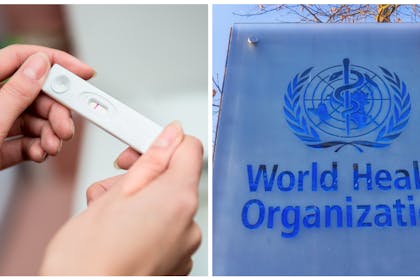1 in 6 people affected by infertility, report finds

A landmark report from the World Health Organization (WHO) has found 1 in 6 adults across Europe and the UK are affected by infertility issues...
If you've struggled with trying to get pregnant, then you are certainly not alone.
A new report from the World Health Organisation (WHO) has claimed roughly 1 in 6 adults across Europe and the UK (16.5%) are affected by infertility.
The research also found the global average rate was 17.5%, or 1 in 6 adults.
FREE NEWBORN NAPPIES
The government agency shared its first global estimate on infertility in more than a decade, explaining that the 'sheer proportion' of people affected showed the world needed to increase access to expensive fertility treatments.
Outside of Europe and the UK, the Eastern Mediterranean had the lowest worldwide infertility rate by region at 10.7%.
Meanwhile, the Western Pacific was the region with the highest infertility rate, at 23.2%.

Despite the findings, the UN agency could not say for sure that infertility rates had increased over the last 10 years, and did not look at what caused infertility.
Speaking to journalists, the WHO's head of contraception and fertility care, Dr James Kiarie, said: 'We cannot, based on the data we have, say that infertility is increasing. So we must say that probably the jury is still out on that question.'
'Infertility does not discriminate'
Commenting on the landmark report, Dr Tedros Adhanom Ghebreyesus, WHO director-general, said: 'The report reveals an important truth — infertility does not discriminate.
'The sheer proportion of people affected show the need to widen access to fertility care and ensure this issue is no longer sidelined in health research and policy, so that safe, effective, and affordable ways to attain parenthood are available for those who seek it.'
Lack of quality and consistent data
To calculate the global infertility figures, the WHO analysed 133 high quality studies from across the globe that were carried out between 1990 and 2021.
However, the UN agency noted one key issue they found was a lack of quality and consistent data throughout many countries.
As well as this, the majority of studies analysed only focussed on women's infertility, rather than that of men or couples.
'A number of fertility treatments available'
For those struggling with infertility, Dr James Hopkisson, Medical Director at TFP Fertility UK offered some advice.
He said: 'If you have been trying for at least 6 to 12 months without success, it's worth speaking to either your GP or getting an expert evaluation on your fertility potential.
'It is very important that when looking for advice on fertility you are both confident and reassured by the advice given by your fertility expert.
'It is also important to have some baseline tests organised such as hormone profiles and semen analysis so that the clinical team can give appropriate advice.
'There are a number of fertility treatments that we can offer ranging from ovulation induction through to IVF. In many cases jumping to IVF maybe unnecessary and getting a balanced view of treatment options is crucial.'




